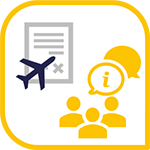4.9.3. Information on the return procedure for rejected applicants

Several EU+ countries improved existing procedures or launched new activities to inform rejected applicants and third-country nationals about the options available to return to their country of origin.
In the Netherlands, an existing website on return procedures was integrated into the main website of the Repatriation and Departure Service. In addition, Dutch Council for Refugees’ platform, Forrefugees, was set up to provide information to rejected applicants and offer an overview in nine different languages of return projects to 20 countries.895
Norway provided grants of NOK 1 million to voluntary organisations, individuals and non-profit companies to develop measures for the provision of information for assisted returns. The new measures will target people who are outside of reception centres.896
The newly-established Returns Unit in Malta implemented a series of activities during 2021. A system of return counselling was introduced with over 700 migrants being counselled by Returns Unit officers. The unit made a concerted effort to expand its outreach. Promotional material was designed and distributed among several stakeholders, including leaflets in English, French and Arabic and flyers in Arabic, Bengali and English. A booklet on “Stories of Return” was developed and translated into English, French and Arabic (produced by the IOM). Posters, leaflets and roll-up banners in five languages (English, French, Arabic, Somali and Amharic) were designed and produced jointly with the IOM and disseminated in open and closed reception centres, NGOs and homeless shelters. Information cards were made available in English. In 2021, the Returns Unit set up a Facebook page, “Voluntary Return Malta”, which can be easily accessed by scanning a QR code. Additionally, the Returns Unit offered a service through mobile phones giving migrants the opportunity to communicate with return counsellors by WhatsApp. With the IOM’s support, a video on assisted voluntary return and reintegration was produced in four languages, and new information material was published. In addition, the Returns Unit continued conducting return counselling sessions, during which migrants are counselled on an individual basis and provided with information on possible return options.897
895-897 footnotes not visible in the text
- 895Ministry of Justice and Security | Ministerie van Justitie en Veiligheid. (2020, December 30). Informatie over terugkeerprojecten [Information about return projects]. https://www.dienstterugkeerenvertrek.nl/actueel/nieuws/2020/12/16/informatie-over-terugkeerprojecten
- 896Norwegian Directorate of Immigration I Utlendingsdirektoratet. (2021, November 22). Tilskudd til informasjonstiltak om assistert retur [Grant for information measures on assisted return]. https://www.udi.no/aktuelt/tilskudd-til-informasjonstiltak-om-assistert-retur3/
- 897European Migration Network. (May 2021). 34th EMN Bulletin. https://ec.europa.eu/home-affairs/system/files/2021-05/00_emn_34th_bulletin_en.pdf

